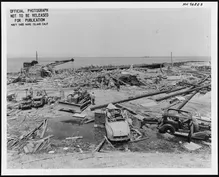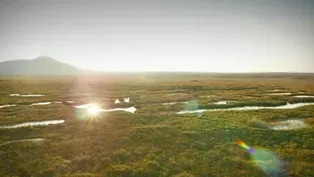
The evolution of Bangladesh’s anti-government protests
Clip: 8/4/2024 | 5m 39sVideo has Closed Captions
How Bangladesh’s student protests ignited a broader movement against the country’s leader
Bangladesh is under a nationwide curfew and internet blackout after a weekend of violent clashes between security forces and protestors. Almost 300 people have died since the start of the protests, which have grown into a national movement against Prime Minister Sheikh Hasina and her increasingly autocratic rule. Ali Rogin reports.
Problems with Closed Captions? Closed Captioning Feedback
Problems with Closed Captions? Closed Captioning Feedback
Major corporate funding for the PBS News Hour is provided by BDO, BNSF, Consumer Cellular, American Cruise Lines, and Raymond James. Funding for the PBS NewsHour Weekend is provided by...

The evolution of Bangladesh’s anti-government protests
Clip: 8/4/2024 | 5m 39sVideo has Closed Captions
Bangladesh is under a nationwide curfew and internet blackout after a weekend of violent clashes between security forces and protestors. Almost 300 people have died since the start of the protests, which have grown into a national movement against Prime Minister Sheikh Hasina and her increasingly autocratic rule. Ali Rogin reports.
Problems with Closed Captions? Closed Captioning Feedback
How to Watch PBS News Hour
PBS News Hour is available to stream on pbs.org and the free PBS App, available on iPhone, Apple TV, Android TV, Android smartphones, Amazon Fire TV, Amazon Fire Tablet, Roku, Samsung Smart TV, and Vizio.
Providing Support for PBS.org
Learn Moreabout PBS online sponsorshipLAURA BARRON-LOPEZ: Bangladesh is under a nationwide curfew and internet blackout after a weekend of violent clashes between security forces and protesters, almost 300 people have died, with thousands more injured.
The protests have grown into a national movement against Prime Minister Sheikh Hasina and her increasingly autocratic rule.
Ali Rogin has more.
ALI ROGIN (voice-over): In Bangladesh, protests over a government jobs policy ignited a broader movement against the country's longtime leader.
Protesters say Sheikh Hasina's violent crackdown is destroying her image and legacy tied to the birth of the nation itself.
JAHIRUL ISLAM, Waiter (through translator): We want the government to resign.
We want to go back to the golden times we had in the past.
ALI ROGIN (voice-over): Student protests began in mid-July against a government workforce quota system, which reserves some jobs for veterans of the country's 1971 war for independence and their families.
Hasina responded with violence, imposing an internet blackout and curfew, with security forces given an order to shoot on site.
The government reduced the quota after demonstrations began, but the protests had already expanded to calls for justice for those killed in the crackdown, a toll now exceeding 200.
MEGHMALLAR BOSU, Student Dhaka University: They are killing people indiscriminately.
People are being jailed.
People are being tortured.
At the same time, you are seeing the courage of the people of Bangladesh, who have decided they will not sit down.
They will not go down without a fight.
ALI ROGIN (voice-over): Hasina and the quota system are part of Bangladesh's founding story.
Her father was Sheikh Mujibur Rahman, who led the fight for an independent Bengali state after the partition of British ruled India in 1947.
The Muslim majority areas became East and West Pakistan, but the Bengali speaking East Pakistanis faced exploitation and marginalization from the west.
Mujib helped found the Bengali nationalist Awami League, which fought for independence at the polls and eventually in a bloody war against West Pakistan in the wars nine months about 3 million people were killed and millions more displaced.
Mujib became independent Bangladesh's first prime minister, and put the quota system in place as a reward for Bangladesh's freedom fighters.
He was assassinated in 1975 and Hasina positioned herself as his political and ideological successor.
SALIL TRIPATHI, Writer and Author: People see her as a harbinger of democracy, the daughter of the father of the revolution, and in 1991 actually gets elected to be the prime minister.
And then she loses in 1996 and from 1996 to 2008 she continues to fight for democracy and gets a lot of support, lot of goodwill.
ALI ROGIN (voice-over): Salil Tripathi is a writer and the author of a book on "The Bangladesh War."
He says after Hasina regained power, her commitment to democracy waned as she won three disputed elections in a row.
SALIL TRIPATHI: All of that has been accompanied by a period of serious human rights violation and economic downturn and this perception of nepotism and corruption.
ALI ROGIN (voice-over): He says most of the beneficiaries of the quota system were from the founding Awami League, excluding supporters of opposition parties.
SALIL TRIPATHI: The quota became the symptom, and now it has become full scale opposition to the rule.
ALI ROGIN (voice-over): Since protests began, police have arrested at least 11,000 people.
SHEIKH HASINA, Prime Minister, Bangladesh (through translator): Many were punished after getting out from jail.
They're showing the same face.
They will not be spared easily.
ALI ROGIN (voice-over): One student protest leader said police abducted, sedated and detained him for days.
ASIF MAHMUD, Coordinator, Students Against Discrimination in Bangladesh (through translator): I think they took us away to refrain us from making decisions about the movement.
While they massacred all these people, they made some of us disappear.
Some were beaten.
We were pressured to stop the movement.
ALI ROGIN (voice-over): Hasina stoked tensions when she referred to the protesters as Razakars, a wartime slur for supporters of the Pakistani military who fought the Bangladeshi freedom fighters.
SALIL TRIPATHI: The Razakars is the word she used on the 14th of July.
And so the students started a protest saying that I'm here Razakars.
You are Razakars.
Everyone is a Razakar as a kind of you own, and campaign against it.
And the protest just snowballed.
ALI ROGIN (voice-over): Now, international pressure is mounting.
The United Nations and European Union are calling on the government to halt its attacks.
The UN human rights chief wants the government to disclose details about the crackdown, but Tripathi says the number of crises spiraling elsewhere in the world is fracturing the world's attention.
SALIL TRIPATHI: On one hand, you have the conflict in Ukraine, then you the conflict in the Middle East, in Gaza, the U.S. is in the middle of its own election.
The Venezuela election has thrown, you know, rabbit out of the hat now.
So I think there are lots of other priorities which are which are also distracting the international community.
ALI ROGIN (voice-over): Inside Bangladesh, the National reckoning persists.
SYED SADMAN, Student Protester (through translator): People make mistakes.
If she would have apologized, everything would go back to normal.
If she cannot control it, things will keep getting heated.
ALI ROGIN (voice-over): As protesters continue to defy police in the streets, it's clear that for some, an apology is no longer enough for.
PBS News Weekend, I'm Ali Rogin.
The hidden history of the Port Chicago 50
Video has Closed Captions
The hidden history of Black sailors unjustly punished after the Port Chicago explosion (7m 1s)
A look at the world’s newest UNESCO World Heritage Sites
Video has Closed Captions
A look at some of the world’s newest UNESCO World Heritage Sites (1m 26s)
Study finds night owls have ‘superior cognitive function’
Video has Closed Captions
Study finds night owls have ‘superior cognitive function’ compared to early risers (5m 35s)
Providing Support for PBS.org
Learn Moreabout PBS online sponsorshipSupport for PBS provided by:
Major corporate funding for the PBS News Hour is provided by BDO, BNSF, Consumer Cellular, American Cruise Lines, and Raymond James. Funding for the PBS NewsHour Weekend is provided by...














